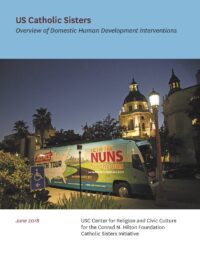Introduction
The Conrad N. Hilton Foundation’s Catholic Sisters Initiative launched its first five-year strategy in 2013. As the measurement, evaluation and learning (MEL) partner of the Sisters Initiative, the Center for Religion and Civic Culture (CRCC) at the University of Southern California has been documenting and analyzing the Sisters Initiative’s grant-making strategy since 2014.
At the request of the Sisters Initiative, CRCC conducts research that informs the work of the Sisters Initiative. In order to understand the role of Catholic sisters domestically in human development, this report responds directly to the Sisters Initiative’s request for information on areas of sister-driven human development work in the United States. This report will inform the implementation of the second strategy.
The contributions of Catholic Sisters in North America toward human development are especially well recognized in the areas of education and health care. In fact, the US House of Representatives has even acknowledged sisters’ role in establishing hospitals, clinics and schools in the US through a resolution that was introduced in June 2012 during the 112th Congress, “H.Res. 689 — 112th Congress: Honoring Catholic sisters for their contributions to the United States.”
Expanding beyond the schools and health care ministries that they are well known for, North American sisters have founded and organized a wide range of ministries serving the needs of their parishes and local communities, especially the most vulnerable and marginalized. In this report, CRCC looks at Catholic sisters who are doing human development work across the US and Canada, especially in areas where there might be resonance with the Sisters Initiative’s human development strategy in other parts of the world. The Hilton Foundation has taken a leadership role within the philanthropic world to support the United Nations Sustainable Development Goals (UN SDGs), and the Sisters Initiative is similarly committed to raising the profile of sisters as approachable partners-of-choice in achieving the UN SDGs. We thus also examine areas where sisters are part of a larger policy effort to address urgent, specific needs.
What follows is an overview of some of the major areas that sisters have been involved in, including human trafficking, immigration and environment, as well as impact investment and Native American ministry. These are specific areas that the Sisters Initiative is interested in focusing on in the next iteration of its strategy. Rather than provide a comprehensive survey of sisters’ domestic engagement in human development, this report focuses on the existing strengths and challenges that sisters face when working in these five areas. In exploring these issue areas, the report also indicates how each of these areas align with the UN SDGs. Our summary of each issue area concludes with a brief discussion of salient points and their significance for the Sisters Initiative’s future funding strategy.
CRCC generally found that sisters often take a three-pronged approach when they confront human development challenges in the US: through advocacy for policy and systems change; awareness-building within the community, the Catholic Church and the public; and through direct service provision to those to whom they minister. In exploring the main issue areas of human trafficking, immigration and environment, we use advocacy, awareness and direct services as a helpful heuristic to understand sisters’ unique role in human development, both in the US and elsewhere.
Click here to read the full report
